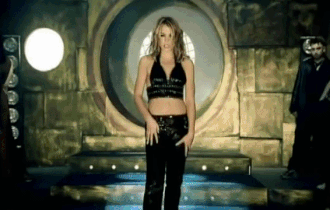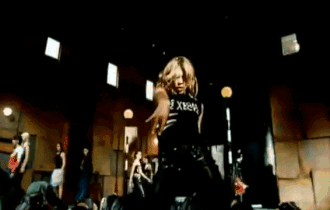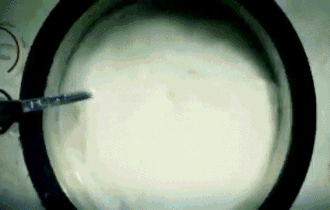Released: 15th May 2000
Writers: Billie Piper / Eliot Kennedy / Mark Cawley / Mike Percy / Tim Lever
Peak position: #1
Chart run: 1-4-11-22-31-31-38-44-49-45-64-X-73
After a tumultuous first album campaign, Billie Piper returned a year later to stake her claim on the charts again. Now known by her full name and cast under a Britney Spears-shaped shadow, her comeback needed to be bigger, bolder and better than anything preceding it. Conveniently, that’s precisely what Day & Night delivered.

The song, however, is not the only factor to consider. There were two main challenges facing Billie Piper at this point; the first being the aforementioned presence of Britney Spears in the charts. The pair had briefly crossed paths at the tail-end of the Honey To The B campaign, but mid-2000 saw their respective careers draw parallel with one another with the near-simultaneous launch of their sophomore album campaigns. And while of course, Britney Spears’ commercial success had been greater and broader than Billie Piper’s, in terms of their UK position the pair were in remarkably similar stead, having scored two #1 singles and two further top five hits apiece with their first four releases. Britney Spears had already thrown down the gauntlet with her comeback single Oops!…I Did It Again having debuted at #1 just weeks earlier. The ball was now in Billie Piper’s court to mount a response.

There was a slightly more problematic issue facing Day & Night though, and it had nothing to do with the music. The foundation of Billie Piper’s early success had been building her appeal to the female contingent of the pop audience (a notoriously tricky endeavour at the best of times). But when she embarked on a relationship with Ritchie Neville from Five, things quickly turned sour. For a young pop star – and indeed many pop fans – their pairing had been a crash-course in what happens when thousands of impressionable fans are scorned at once. The vitriol shown towards Billie Piper was extreme. In the days before social media, broken-hearted fans of Ritchie used any means possible to express their dislike: audibly booing her at awards shows, defacing posters, writing hate mail to Smash Hits and other assorted pop magazines…in hindsight, it was a tad pathetic, and the impact it had on Billie Piper had started to become evident. One thing is for certain, though, Innocent Records knew that Day & Night was facing an uphill climb.

Good thing then that the song itself was an absolute killer. Ditching the cutesy ‘girl next door’ vibe of the earlier singles, gone was the nursery rhyme-esque chant-and-reply structure of Because We Want To and Girlfriend. Day & Night was instead a much spikier effort with an immediately harder edge. This was pop with attitude and purpose; the sort that gives you no choice but to sit up and listen. With pounding beats and thumping synths, it was a marked change in direction for Billie Piper. Crucially though, it wasn’t one that felt forced or unnecessarily serious; pop music was rapidly evolving, and Day & Night followed in precisely the right direction.
It just ain’t the same when you’re away
You are my inspiration
I’m hanging on to every word you say
‘Cause you are my motivation
Though earlier material (Honey To The Bee, in particular) had a sexual subtext, this track is a lot more overt about its intentions, albeit still in a non-explicit manner. Nonetheless, lyrics such as: “All of the day, all of the night, you do the things that make me feel so right” leave little to the imagination in terms of the tone of the relationship depicted within the song. But there’s never anything specifically tactile directly referenced; realistically because within the confines of her artistic and physical maturity, Billie Piper’s appeal was still primarily toward the younger end of the teen market. It also conveniently avoids detailing any behaviour that might be taken as a further sleight by Five‘s rabid fanbase.

For all of its intentions as a monster pop track, Day & Night still contains fleeting moments that showcase the strengths of Billie Piper’s vocal tone (which remains incredibly underrated). The second verse is a highlight, as the beat eerily drops and reignites. There’s quite a tender sadness to the lyrics: “I need you tonight, but you’re not around, I need to hear your voice baby…” and it’s probably the part of the song that gives an insight into what Billie Piper was experiencing. There’s also much to appreciate about the sheer commitment by which the middle-eight sounds as much a product of the year 2000 as it can. Following a complete fade out for a brief second, amidst a twinkling sound effect, there’s an ad-libbed shout (“Oh YEAH!”) and an of-its-time telephoned-in spoken vocal effect (“When you’re coming home”).

The unmitigated highlight of Day & Night is the chorus. Or should that be choruses? Not content with just one, the track packs in two and essentially renders itself more chorus than anything else. Strictly speaking, the: “‘Cos the only time I think of you, is every day and all night through” section seems like it’s intended as a pre-chorus from a production perspective, but it’s so prominent and hook-laden that the earlier: “You make me feel so right, every day and night” couplet functions better in that regard. So, after the first chorus reaches a satisfying climax, it segues into a second one (“All of the day, all of the night…”) that kicks things up a gear again. It’s incredibly well constructed and gives Day & Night a heightened sense of melody befitting of a single that was attempting to reposition Billie Piper alongside her American peers.

The final piece of the puzzle was the music video and needless to say, Day & Night excelled. It manages to pack a plethora of content into just shy of four minutes. There are some loose parallels with the Because We Want To video, such as Billie Piper’s sinister passage into what one would presume to be an underground club (but transpires to be a stylised sewer). Compared to the CGI rhino bouncer from her debut single, this is a busier and more mature setup, utilising four sets, four outfits and two hairstyles. The choreography goes hard, even throwing in some stunts (at one point Billie Piper runs up the wall and flies above the backing dancers). However, in quintessentially British terms, there is one genuinely iconic scene: the launderette. What pop fan hasn’t since fought the urge to spin around with an open box of washing powder while doing the laundry?

Commercially, Day & Night did everything it needed in keeping Billie Piper apace with her chart rivals. The single sold 104,208 copies to debut at #1, and ended as the 47th biggest-seller of 2000 with 243,000 copies. More importantly, it affirmed that with the right material, she could overcome the swathe of negativity directed towards her. Indeed, for a brief moment, there was absolutely no reason to believe Billie Piper couldn’t be the UK’s answer to Britney Spears (albeit her success would always likely be on a smaller scale). Day & Night created real momentum for a second album, even if Innocent Records chose to handle the campaign in a slightly unusual manner from here on in…



